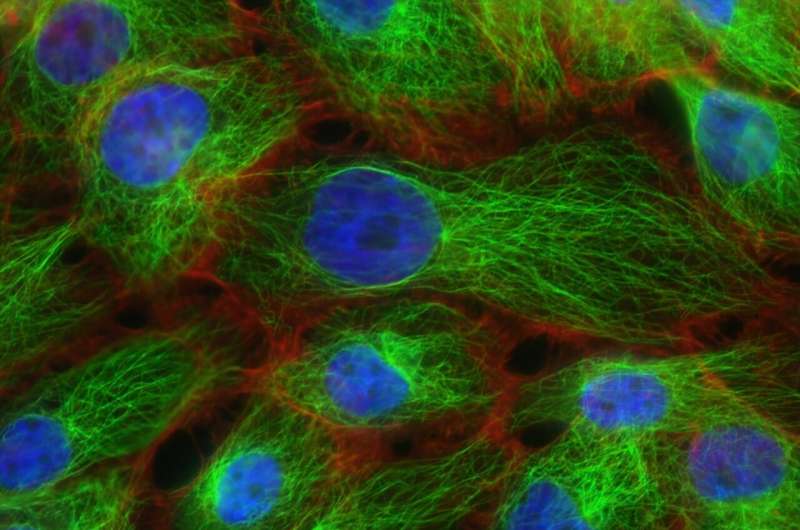Researchers discover distinct genomic characteristics of breast cancer in women with PTEN hamartoma tumor syndrome

Cleveland Clinic researchers have uncovered genomic characteristics of breast cancers associated with PTEN hamartoma tumor syndrome (PHTS) that differentiate them from sporadic breast cancers. The findings, published in the American Journal of Human Genetics, have important implications for the personalized management of PHTS-related breast cancers.
While most cancers are sporadic, meaning they arise due to somatic (non-heritable) mutations that occur randomly due to external factors or molecular changes, some cancers are linked to germline (heritable) mutations that are passed from parent to child. PHTS is a hereditary cancer predisposition syndrome caused by germline mutations in the tumor suppressor gene PTEN that increases the lifetime risk of breast cancer up to 85% compared to 12% in the general population.
"As clinical genetic testing becomes more widely accessible, we undoubtedly will see a rise in the incidence of PHTS-associated breast cancer," said Charis Eng, MD, Ph.D., Chair of the Genomic Medicine Institute and the study's corresponding author. "PHTS-associated breast cancers often develop at a younger age and may progress more aggressively than their sporadic counterparts, but they are treated similarly, which underscores the need to better understand any underlining genomic differences between PHTS-associated and sporadic breast cancers."
To address this need, the researchers performed exome sequencing (a technique that analyzes the protein-coding region of the genome) on samples from 44 women with germline PTEN mutations who developed breast cancer and compared the data to samples from women with sporadic breast cancers.
They specifically investigated somatic mutations in both groups because it is posited that both copies of a tumor suppressor gene must be mutated in order for cancer to develop, which is known as Knudson's two-hit hypothesis.
"Following this hypothesis, individuals with PHTS inherit the first PTEN mutation, or the first hit, and then acquire the second hit via a somatic mutation on their other PTEN gene," noted Dr. Eng. "In contrast, sporadic cancers would occur when both tumor suppressor genes are mutated randomly, which is less likely or takes longer, thus helping to explain why the risk for developing cancer at an earlier age is greater for those with germline mutations."
Their analysis revealed that PHTS-associated breast cancers have distinct somatic mutational profiles compared to sporadic breast cancers. For example, they discovered that PTEN and PIK3CA were the most frequently somatically mutated genes in PHTS-associated breast cancers while TP53 was most frequently mutated in sporadic breast cancers. Notably, the PHTS group had a significantly higher frequency of somatic PTEN mutations compared to the sporadic group, as well as a lower mutational frequency in PIK3CA, indicating that somatic mutations in PTEN are the main drivers of PHTS-associated breast cancers. In addition, they found that somatic mutations in PTEN and PIK3CA were mutually exclusive in the PHTS group but not in the sporadic group.
"Our findings reveal a distinct breast cancer biology in the context germline PTEN mutations that spotlights the need to develop more targeted, personalized strategies to effectively treat and, in time, prevent PHTS-associated breast cancers," said Dr. Eng.
Dr. Eng is the Chair and Director of the Center for Personalized Genetic Healthcare, which includes the PTEN Multidisciplinary Clinic (designated as a PHTS Clinical Center of Excellence by the PTEN Hamartoma Tumor Syndrome Foundation) for children and adults with a confirmed or possible diagnosis within the PHTS spectrum. She was the first to link PTEN to Cowden syndrome, which is a PHTS disorder.
Takae Brewer, MD, an Ambrose Monell Foundation cancer genomic medicine clinical fellow in the Eng lab, is first author on the study.
More information: Charis Eng, Exome Sequencing Reveals a Distinct Somatic Genomic Landscape in Breast Cancer from Women with Germline PTEN Variants, The American Journal of Human Genetics (2022). DOI: 10.1016/j.ajhg.2022.07.005. www.cell.com/ajhg/fulltext/S0002-9297(22)00309-3




















